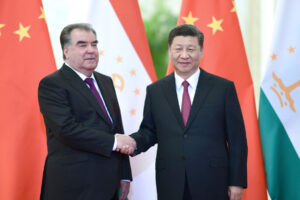Delegates at Labor’s National Conference in August will have to pay more attention than usual to foreign and defence policy. Dissent on AUKUS is spreading, while Palestine is a promise to keep.
The United Nations General Assembly in 1947 called for establishment of a Jewish state, which had been anticipated by the League of Nations and the Balfour Declaration of 1917. The State of Israel was established in 1948, setting off wars between Israel and its Arab neighbours, which have alternated with peace talks ever since.
Waves of Jewish migration, and Israel’s forcible appropriation of Palestinian lands, created a very different map to that originally approved by the UN. The exodus of Palestinians to neighbouring countries produced generations of perpetual refugees. Those who remain in their homeland suffer continuing deprivation and violence at the hands of the Israeli Armed Forces.
The Palestinian National Authority was established by the PLO in 1993, following the Oslo accords. Its aim was to secure endorsement of the ‘two-state solution’, and international recognition of Palestine’s statehood has now grown to include 139 UN member states. A UN resolution in November 2012 on the status of Palestine stressed the urgent need for further negotiations to resolve ‘all outstanding core issues, namely the Palestine refugees, Jerusalem, settlements, borders, security and water’.
Those issues remain unresolved, however, and ‘core’ is the right word for them. The origins of twenty-first century terrorism, militarism, refugees, and Brexit, can all be traced back to the Israeli-Palestinian question. Actual nuclear weapons in Israel and prospective ones in Iran are among its other consequences.
On Palestine, Australia’s position varies as governments change. As soon as the Coalition replaced the ALP in 2013, Australia reversed the ‘abstain’ position negotiated by Bob Carr as Foreign Minister, and voted alongside the US against Palestinian statehood. Under Morrison, Australia went further, proposing to regard West Jerusalem as Israel’s capital, and to transfer our embassy there from Tel Aviv.
That didn’t happen, and Carr has recently been joined by a fellow member of the Labor right, former foreign minister Gareth Evans, in pushing for implementation of Labor’s election platform undertaking on Palestine. With the Victorian ALP conference supporting that on 17-18 June, it has prospects of being passed at the national conference in August. There, the Labor left, of which Prime Minister Albanese and Foreign Minister Wong are members, will be in control for the first time since 1955. The result could be a Palestinian Embassy in Canberra and an Australian one in Ramallah.
If Australia breaks with its US ally over Palestine, doing so again by backing away from the AUKUS agreement is less likely. But a motion opposing AUKUS has been passed by the Queensland Labor conference, and anti-AUKUS statements are spreading within Australia and beyond. The submarine component of AUKUS is widely seen as undeliverable, unmaintainable, uncrewable, and unaffordable. Over and above the nuclear-powered boats, concerns are growing about nuclear waste, the American military presence in Australian land, sea and air, and transit of US troops and weapons. It is not clear that the Australian government will be consulted about, or have any control over, the uses to which they will be put.
Talk from Defence Minister Richard Marles about our independence and sovereignty convinces few civil society groups in Australia, and few unionists. His claim that spending at least $368 billion on the means to attack China is about ‘deterrence’ is not even supported by Penny Wong. She endorses the status quo over Taiwan, which implies not attacking China.
Both of them must know that such an attack by the US, whether or not Australia or Japan are involved in it, would be a catastrophic failure. The long lead-time before we have any deployable nuclear submarines may even make a pre-emptive assault by China, or a revenge attack, on US installations in Australia more likely. The worst prospect is that such an event in the South or East China Sea could occur in response to an incident, accidental or orchestrated by the US, which would invoke ANZUS.
What the ALP national conference in Brisbane on 17-19 August should agree to recommend to Marles and Wong is to prepare for peace, not for war; to remind them of our treaty commitments not to threaten or use force against other nations; to urge them to forewarn the US that Australia will not join a coalition for war over Taiwan; and to listen to the electorate, including many who want to change the secretive way we go to war. The delegates’ most significant achievement will be to pass a resolution against AUKUS, before it’s too late.
Source : johnmenadue.com
















